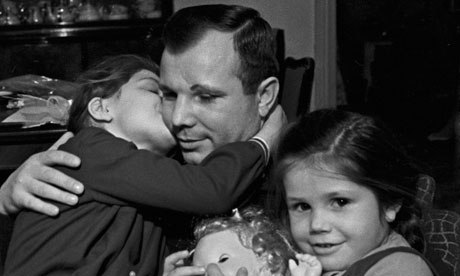Yuri Gagarin's private passions: Pushkin and The Little Prince
A new, deeply personal picture of the first man in space has emerged from a rare interview with his daughter Elena

Pilot and cosmonaut Yuri Gagarin with his daughters Elena and Galina. Photograph: Alexander Mokletsov/ RIA Novosti / TopFoto
To the rest of the planet, he was a pioneer, a hero of galactic proportions and the ultimate propaganda weapon. But to his family, Yuri Gagarin was a poetic soul with a passion for Pushkin and Saint-Exupéry who wrote his wife a letter telling her not to remain alone in the very likely event that he never returned from the epochal flight he made 50 years ago on Tuesday.
A fascinating and deeply personal picture of the first man in space has emerged from a rare interview with his elder daughter, Elena Gagarina.
And while it comes as little surprise that the cosmonaut had no true conception of "internal pain" – and was so mentally and physically disciplined that he would take naps of exactly 40 minutes and wake up "on the dot" without an alarm clock – he was far more than a perfectly drilled machine.
In the interview, which was conducted by Andrea Rose from the British Council and forms part of a documentary to be broadcast on BBC Radio 4, Gagarina recalls a man whose life was indelibly marked by the Nazi occupation of his village during the second world war.
Perhaps because the Germans kicked the family out of their home and forced them to live in a dugout in the garden for three years, Gagarin became a keen student of history.
"He was curious and interested in everything," remembers his daughter. "He was part of a generation that had had so few opportunities open to them and then, after the war, they were avid for everything."
Literature, too, became a fascination.
"He knew Pushkin very well, and Tvardovsky and Ivakovsky – poetry connected with the war. He liked a great deal of literature: Lermontov, and Saint-Exupéry, for example. He liked to read to us in a very loud voice. It was too difficult for us to understand at the time, but he still liked doing it."
Despite his fondness for the work of the French aviator and writer, Gagarin's preferences were characteristic – and sadly prescient.
"He thought of himself as pilot. His favourite book wasn't The Little Prince, it was Night Flight [a novel about a doomed airmail flyer]."
Before boarding Vostok 1 on 12 April 1961 for the flight that would propel him into orbit and history, Gagarin deployed a little white lie to try to protect his wife.
"She knew what he wanted to do, and when he was leaving for Baikonur he told her what he was doing," says Gagarina. "But he didn't tell her the actual date. He told her the flight would take place a few days after the real date, so she wouldn't be worried."
He himself, however, was under no illusions about his mission.
"He wrote a letter for my mother saying that it was likely he wouldn't return, because the flight was extremely dangerous, and that he wanted her not to remain on her own in that case. But he didn't give her the letter. She found it by chance among his things when he came back. He hadn't wanted her to find it, and told her that she should throw it away. But of course, she kept it."
But, after a 108-minute orbital flight of Earth, Gagarin did return – to a hero's welcome, instant global fame and meetings with everyone from the Queen to Fidel Castro.
In the seven years between his space adventure and his death in a plane crash at 34, though, the cosmonaut grew weary of recounting his experiences.
"He talked about it so often, and with so many people, that it seemed to me he was rather tired of talking about it," remembers Gagarina. "What he talked about to me was his childhood – about what it was like to grow up in Smolensk, and about the war."
As the world prepares to celebrate the 50th anniversary of the first man in space – the British Council will unveil a statue of Gagarin on the Mall in London later this year – Elena Gagarina ponders, in a fittingly matter-of-fact manner, her father's extraordinary feat.
"It was just a part of my life and growing up. He was always the First Cosmonaut of the World for me, and his whole life was connected with space and space exploration. There wasn't a before and after for me."
• Random Edition, 1961 First Man in Space 50th Anniversary Special, is on BBC Radio 4, 11 April at 11am
No comments:
Post a Comment